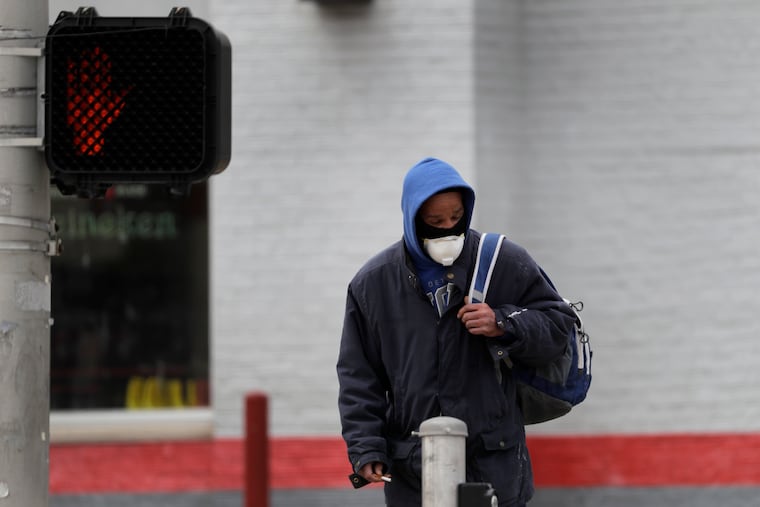The racial disparities of coronavirus point yet again to the need for reparations | Opinion
One precondition that drives the racial difference in health outcomes for coronavirus: black financial precarity, captured best by the chasm in wealth.

In 2019, black reparations commanded their largest modern spotlight. The pinnacle was the Juneteenth televised House Judiciary Committee hearing on a bill to establish a study commission for reparations to African Americans.
Today, attention has receded. The remaining Democratic Party candidate shows little enthusiasm for the policy, and President Donald Trump has dismissed it.
Now the COVID-19 crisis threatens to push all other topics off the public table. But it also gives us the opportunity to imagine a better world post-pandemic and highlights the areas that most need fixing.
Racial divergence in the impact of COVID-19 — which is proving deadliest for black Americans in Philadelphia and beyond — powerfully reinforces the importance of reparations.
Wealth deprivation places huge burdens on black families even in “good times.” An important commentary from the Center of American Progress outlined the ways wealth protects against want, and how its absence dooms blacks to destitution. Prior to the pandemic, only 45% of black households could pay a $400 emergency expense and meet bills, as opposed to 60% of white households. The pandemic magnifies that financial vulnerability. Wealthy households have a greater capacity to ride out storms of unexpected adversity, including job loss, medical emergencies, and other income shocks.
The wealth gap is entrenched. Black American descendants of persons enslaved in the United States constitute 13% of the nation’s population but possess 2.6% of its wealth. It would require $10-$12 trillion to raise this group’s share of the nation’s wealth to match its proportion in the population, an average of about $800,000 per household. One striking reality that exemplifies the disparity: Three white billionaires, Jeff Bezos, Bill Gates, and Warren Buffett, hold more wealth than 80% of black Americans.
An appropriately designed black reparations initiative will eliminate racial wealth inequality. The vast imbalance in black and white wealth is the most pronounced measure of cumulative economic damages wreaked on African Americans by slavery, legal segregation, white terrorism (consider lynchings during the Jim Crow period), vast overincarceration, and ongoing discrimination in housing, employment, policing, credit markets, and health care.
» READ MORE: Pa. released figures on the coronavirus and race, but not specific geographic data. Experts say that’s a problem.
As for homeownership: After the Civil War, free blacks were denied the promised 40-acre land grants while whites received 160-acre grants in the west under the Homestead Acts. The federal government later sanctioned restrictive covenants, redlining, predatory mortgage lending, and the discriminatory application of the G.I. Bill, blocking black acquisition of housing that would help build equity.
These old disparities are worsening under the coronavirus. Black workers are overrepresented in socially critical but undervalued sectors like food services, health services, and child-care provisions. These personal contact, personal service jobs are not conducive to maintaining the “social distancing” now required for health safety. Consequently, blacks discriminately face either a greater risk of continued employment in jobs with high degrees of likelihood of exposure to the coronavirus, or outright job loss. And job loss frequently results in loss of access to health insurance, especially dangerous in the present moment. The national unemployment rate is projected to reach 30%. The black rate, generally twice as high as the white rate, threatens to become the highest on record in U.S. history.
» READ MORE: As reparations debate continues, the University of Pennsylvania has a role to play | Opinion
Meanwhile, more black Americans continue to die in high numbers. As of last week, African Americans alone accounted for more than half of coronavirus deaths in Philadelphia. They’re dying at high rates across the country, in Milwaukee, Chicago, Louisiana, Michigan. Valid partial explanations for the striking imbalance in black-white mortality centers on the presence of preexisting adverse health conditions that place blacks at greater risk of death after contracting the coronavirus. These include higher rates of diabetes, hypertension, heart disease, and asthma, as well as a lack of access to medical treatment.
But another critical adverse precondition lies at the heart of black-white difference in health outcomes: excess black financial precarity, captured best by the chasm in racial wealth.
It is as urgent a time as ever to eliminate the racial wealth gulf and bring the case for black reparations back to center stage. The immediate response to the economic crisis produced by the pandemic demonstrates the federal government can fund reparations. Last month’s congressional appropriation of the $2.2 trillion economic rescue bill reveals the federal government can rapidly find the money when there is a will and a moral imperative to do so. Acting to bolster falling American incomes is an admirable step. It also does not obviate the 155-year obligation to black America.
The debt finally can and must be paid.
William A. Darity Jr. is the Samuel DuBois Cook professor of public policy, African and African American studies, and economics at Duke University. A. Kirsten Mullen, the founder of Artefactual, is a folklorist, museum consultant, and lecturer whose work focuses on race, art, history, and politics. Their book, “From Here to Equality: Reparations for Black Americans in the 21st Century,” is newly available from the University of North Carolina Press.